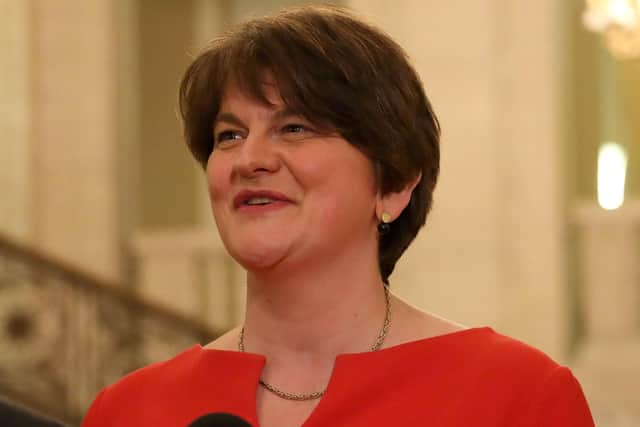Alex Kane: Border poll or not, unionism must work on its message


That doesn’t mean that Arlene Foster, Steve Aiken and the leaders of the smaller unionist parties and loyalist fringes need to talk to Sinn Fein, or even to the leaderships of Fianna Fáil or Fine Gael, but it does mean that they should dare to think the unthinkable and have conversations with each other about all possibilities and eventualities. Even the unexpected and unlikely can be discussed. It’s called preparation.
In September 2012, when unionism was focused on the centenary of the Ulster Covenant, I noted in a column that it also needed to be thinking ahead to the centenary of Northern Ireland in 2021. My argument was that the talents of pro-Union academics, historians, economists, pollsters, PR experts, representatives from party-political unionism and loyalism, along with influencers across the entire pro-Union community (which is actually a very big and diverse community), should be harnessed and tasked to prepare for both 2021 and the succeeding decades. Make the case for the Union. Make the case for NI unionism. Establish a coherent, thought-through strategy for expanding the pro-Union vote.
Advertisement
Hide AdAdvertisement
Hide AdSo, I was interested in Arlene Foster’s comments in a piece for Saturday’s News Letter: ‘We should not be complacent in defending and promoting the overwhelming benefits of being part of the UK. However, we should not lose sight of the fact that the best defence against those who wish to take us out of the UK is to create a socially thriving and economically prosperous Northern Ireland. A Northern Ireland where everyone feels at home and where everyone has a genuine and active stake in determining the future.’


She continued: ‘Last year the DUP began work on developing a Next Generation Unionism approach. This work continues and we must seek to be pro-active in developing our case and building the broadest possible support ... The road will not always be easy. There will be challenges. However this is how we will protect the interests of unionism and secure Northern Ireland’s place for the next 100 years. We all have a role to play in this process and I look forward to getting started.’
I welcome Arlene’s approach, although I would enter one caveat: this must not just be a DUP-led project. The entire pro-Union community must be embraced and involved. Those who support the Union already and many others who could be persuaded to support it in a possible border poll cannot be left to one side during the debate. All voices and shades of opinion need to be heard from the outset and must be represented in whatever form the overarching strategy and policies take.
Unionism isn’t built on a single opinion. Once you move beyond a preference for retaining the constitutional status quo you will discover that there are all sorts of nuances and differences of opinion in play. All of them must be recognised, addressed and then accommodated as far as is possible or practical.
Advertisement
Hide AdAdvertisement
Hide AdThere is another issue which must be addressed; and it’s one that I have written about fairly recently in this column. There remains a tendency within unionism (and I have been guilty of it, too) to blame just about everyone else for whatever present crisis we find ourselves in; and, in my lifetime, I have heard all shades of unionism use ‘crisis’ on a very regular basis. It’s the fault of successive UK governments. It’s the fault of a particular secretary of state. It’s the fault of the media. It’s the fault of the Irish government. It’s the fault of Brussels. It’s the fault of every other party. It’s the fault of ‘peaceniks.’ It’s the fault of the wishy-washy. It’s the fault of the PSNI. And sometimes, when all else fails, it’s the fault of other unionists.
So, let me rephrase the questions I asked a few weeks ago. Why does it seem to be in the interests of successive UK governments to undermine unionism; why do so many within the UK’s political/media establishment seem so willing to listen to the nationalist/republican narrative; why does the NIO seem to find it easier to side with its Irish counterparts than with NI unionism; why do UK prime ministers find it so hard to stand – unambiguously – shoulder to shoulder with unionism; and why does unionism find it so difficult to attract key sympathy and support from supposed friends at key moments (the latest being the proposal – backed by every member of the Conservative Parliamentary Party – to accept, if necessary, a border between NI and GB)?
Personally, I also think that NI unionism needs to think beyond the economic argument (important though it is) when it comes to making its case. At times we make it sound like the subvention is all that really matters: which probably explains why “You couldn’t afford us,” is one of the most common responses to the prospect of a united Ireland. Sometimes the response is built around the NHS, even though we have 300,000 people on waiting lists at the moment and a health service which is massively underfunded. The Union is about more, much more than the economics, and we need to be focusing on the other political/cultural/social et al benefits.
As someone who describes himself – and I’ve done so in front of Irish and Sinn Fein audiences – as an ‘unashamed, unembarrassed and unambiguous’ unionist, I’ve always wanted unionism to be strong enough, eloquent enough and confident enough to make its case. Which is why I want unionism ready and able to make that case from any platform and to any audience.
Advertisement
Hide AdAdvertisement
Hide AdWhether a border poll even happens is, to some extent, irrelevant; what matters is that unionism always campaigns, articulates, reaches out and promotes its positive message on the premise that the border poll is actually happening next week.